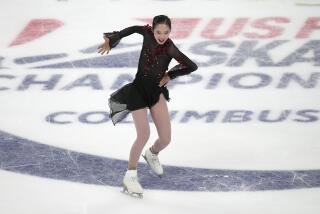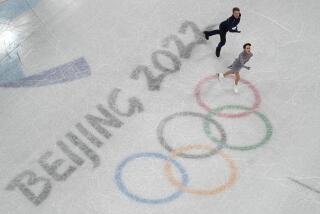She may be little, but she figures big
- Share via
SOCHI, RUSSIA — Yulia Lipnitskaya has gone back to the Moscow area to train for a few days at her home rink.
But her 5-foot-2 presence remains overwhelming in Sochi.
Her two dazzling performances that helped Russia win the team figure skating event a week ago have turned the 15-year-old into the talk of this Olympic town, her entire country and the figure skating world.
“At the beginning of the season, her name wasn’t even at the top two of the women’s list to make the Olympic team,” said Oleg Vasiliev of St. Petersburg, the 1984 Olympic pairs champion. “Now no one is talking about anyone but her.”
It has reached the point that Lipnitskaya’s mother, Daniela, told the newspaper Komosomolskaya Pravda on Thursday that she and her daughter are already tired of journalists, saying, “Yulia is an ordinary girl, and now she is seriously scared of all this attention.”
Vasiliev said Friday that the Russian media had been asked not to bother Lipnitskaya during the final days of her attempt to become the first Russian women’s Olympic singles champion.
“She is already a big hero here,” he said. “If she wins, the reaction would probably be comparable to our hockey team winning.”
Lipnitskaya has taken even her compatriots by surprise after missing part of last season with a concussion.
“Her appearance this year was like a fairy tale, from nowhere,” said Elena Vaytsekhovskaya, a Russian journalist and 1976 Olympic platform diving champion. “For a big part of Russian sports fans -- which is the whole country during the Olympics -- Yulia is a little, fearless warrior who appeared to save the country’s honor.”
Lipnitskaya could become the second-youngest Olympic singles champion. Tara Lipinski, the 1998 champion, would remain the youngest by six days.
“She knew she could be this good,” Lipinski insisted. “She wouldn’t be this prepared if she didn’t want that gold.”
It is a quest that began in earnest for Lipnitskaya at 9, when she moved with her mother from Ekaterinburg to receive better coaching in Moscow.
It is one that requires her to beat reigning Olympic gold medalist Yuna Kim of South Korea and reigning silver medalist Mao Asada of Japan, when the women’s competition begins Wednesday.
The predominantly Russian audience at the Iceberg Skating Palace gave her roaring ovations during her winning short and long programs in the team event, in which Kim did not compete and Asada participated in only the short program. Those Russian fans unfamiliar with the competition may not understand what Lipnitskaya faces in the singles.
Comparing scores is a tricky business, given the different judging panels and tweaks in the scoring system year to year. But it is worth noting that Kim’s winning total in the 2010 Vancouver Olympics, 228.56, is more than 18 points higher than Lipnitskaya’s singles competition personal best of 209.72, which she earned in winning January’s European Championships.
“Yulia is the big star of Russia right now,” said Scott Hamilton, the 1984 Olympic champion, “but she may not look as big when you put her on the ice with a focused Yuna.”
This is Lipnitskaya’s first season on the senior international championship level, for which a skater must be 15 by July 1 of the previous year (she was born June 5, 1998), but her second on the senior Grand Prix circuit. Oddly, she has yet to win a senior national title in three tries, finishing second this season to Russia’s Adelina Sotnikova, 17, also competing here.
“Yulia is brilliant, wonderful, captivating, but she has a couple technical issues, particularly on the double axel and triple lutz, that she needs to address,” Hamilton said. “You have to be sound technically to withstand a growth spurt. I want to see her last and reach a potential that maybe no one has reached before.”
After seeing her skate last week, few have bothered to check that Lipnitskaya’s career results show inconsistency that may reflect those flaws. The flexibility that allows her to contort herself into positions defying the human skeleton and her sure-footedness on difficult jumps were so mind-boggling they wiped out all other impressions.
Referring to her rival’s flexibility, U.S. champion Gracie Gold said, “She’s got no spine, but she’s got iron in her bones.” Gold finished second by 12 points to Lipnitskaya in the team free skate.
The one thing every skating expert says about Lipnitskaya is she has been brilliantly packaged by coach Eteri Tutberidze and choreographer Ilia Averbukh. Their choices of cinematic music allow Lipnitskaya to mask her dispassion and callow interpretive skills with simple gestures, leaving her jumps and brilliant variety of spins in the forefront.
Lipnitskaya’s short-program music is “You Don’t Give Up on Love” by Mark Minkov, a Russian composer best known for his film scores. She starts on one knee, drawing a heart on the ice with a finger, looks up at the sound of a storm, skates unemotionally through the next 2 minutes 50 seconds and finishes on a knee, redrawing the heart that rain had erased.
In the long program, she is the doomed “girl in the red coat” from the Holocaust movie “Schindler’s List.” As John Williams’ haunting music begins, Lipnitskaya looks anxiously over her shoulder. When she reprises that pose four minutes later, after doing 11 jumps, three spins and a footwork sequence with a nearly blank face, it has cleverly created a sense of poignancy.
“Yulia lets her emotion come from the music,” said Sandra Bezic, who choreographed Brian Boitano’s winning Olympic programs. “What good is emotion if you can’t do the technical?”
There is no doubt technical ability is what gives Lipnitskaya a chance to upset more refined skaters such as Kim, Asada and Carolina Kostner of Italy, especially under scoring rules that force skaters to sacrifice presentation to tick off mathematical boxes with pre-defined movements.
“On one hand, Yulia continues the best traditions of the Russian figure skating school,” veteran Russian coach Elena Chaikovskaya said. “On the other hand, she is a real golden nugget, a real genius, totally unique in combining a very modern skating style with components of extreme complexity.”
Part of what has made Lipnitskaya so compelling is the world’s fascination with the next big thing, especially when it is so small and young and seemingly fragile.
“It is how we always look at kids who are so innocent and so cute,” Vasiliev said. “If a little kid produces something like this that you don’t expect, it makes you cry sometimes.”
When Russian President Vladimir Putin congratulated the team figure skating gold medalists, he patted the littlest one, Lipnitskaya, on the head.
--
Los Angeles Times reporter Sergei Loiko contributed from Moscow.
More to Read
Go beyond the scoreboard
Get the latest on L.A.'s teams in the daily Sports Report newsletter.
You may occasionally receive promotional content from the Los Angeles Times.






